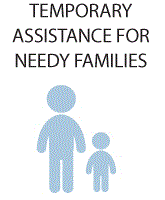The goal of DC’s welfare program — Temporary Assistance to Needy Families (TANF) — should be to improve the economic stability and mobility of families with children, knowing that this is critical to the healthy development of children. Yet without action by the mayor and the DC Council, more than 6,000 vulnerable families with 13,000 children will be cut off of TANF next October, with the chance that most will not find stable employment to replace the lost assistance. DCFPI testified before the DC Council this week about the need to reform DC’s TANF program to be more geared toward promoting family success, rather than relying on a rigid time limit that could push many children deeper into poverty, threatening their chances of success.
Many parents who have received TANF for more than 60 months, like similar families across the country, struggle with barriers that make it very difficult for them to work  or face challenges finding good jobs in an economy with still-high unemployment for non-college educated workers. Families reaching time limits are far more likely than other TANF recipients to face serious barriers to working or finding a job, such as physical and mental health problems, low cognitive functioning, and low levels of education. The DC Department of Human Services has acknowledged that many TANF recipients “have unexposed or undiagnosed barriers that may prohibit them from engaging in services.“ Yet DC’s time limit fails to recognize the complex lives of many poor families. Forty-four states recognize that some families need more time after they reach 60 months to move to self-sufficiency. But DC’s rigid time limit has no exceptions.
or face challenges finding good jobs in an economy with still-high unemployment for non-college educated workers. Families reaching time limits are far more likely than other TANF recipients to face serious barriers to working or finding a job, such as physical and mental health problems, low cognitive functioning, and low levels of education. The DC Department of Human Services has acknowledged that many TANF recipients “have unexposed or undiagnosed barriers that may prohibit them from engaging in services.“ Yet DC’s time limit fails to recognize the complex lives of many poor families. Forty-four states recognize that some families need more time after they reach 60 months to move to self-sufficiency. But DC’s rigid time limit has no exceptions.
A time limit that is responsive to family circumstances is important to ensuring that TANF helps families take steps toward greater independence, rather than pushing children into deep poverty. Families cut off TANF often are not able to replace lost benefits with employment income, research on state welfare time limits finds, leading to chaotic or unstable lives. Not surprisingly, poverty harms children in ways that make it harder to succeed in school and in later life.
And a loss of benefits also would greatly diminish a family’s ability to make progress toward employment or toward addressing other barriers to financial stability. Parents would not be able to focus on the activities that could help them because they would be struggling each day just to meet their family’s most basic needs. It would be difficult for parents to even pay for the bus fare to get to these activities.
As the District moves forward to review and adjust its TANF time limit, we as a city should adopt the goal that the new time limit should help families succeed without pushing any more children into deep poverty. That will create a brighter future for our children and for the District as a whole.
